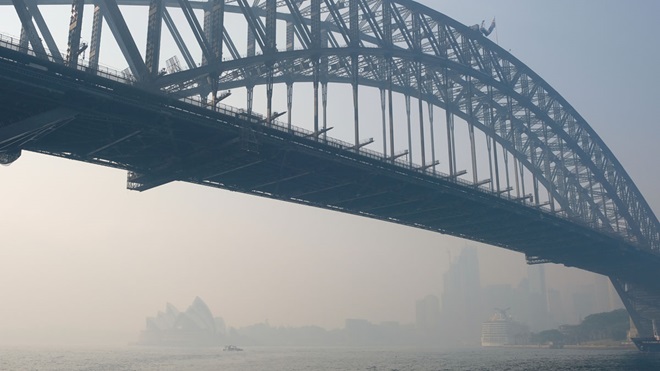Need to know
- Keeping smoke out of your home is the easiest way to protect indoor air quality, but air purifiers can also help
- Air quality is predicted to remain an issue until significant changes in weather occur
- Once the smoke gets into your home, cleaning is the best way to clear it
In many cities and towns across the country air quality is at hazardous levels due to bushfire smoke.
We look at what can be done to protect the air inside your home from smoke and other pollutants.

Check the predicted air quality data for your area so you can prepare for poor conditions.
Be prepared
Staying informed about predicted conditions can help you be prepared for days when air quality is at its lowest.
A spokesperson for the Department of Planning, Industry and Environment (DPIE) in NSW told us that air quality forecasts are made each day using information from a number of organisations.
"The Sydney air quality forecast for the next day is published at 4pm daily on the Environment, Energy and Science website. It is not forecast beyond this, given the unpredictability of factors including the current bushfire emergency and is based on advice from a number of government scientists including forecasters in the Bureau of Meteorology and experts at the NSW Rural Fire Service."
Different departments in other states have responsibility for providing data for their jurisdictions:
- Victoria – the EPA AirWatch service supplies air quality forecasts from around midnight each day.
- Queensland – air quality is tracked throughout the state through a network of monitoring stations.
- South Australia – the EPA provides monitoring.
- WA – an hourly update of air quality is provided by the Department of Water and Environmental Regulation.
- ACT – the Department of Health provides regularly updated data on air quality.
- Tasmania – the Environment Protection Authority provides real time air quality data.
How long until the smoke clears?
It's difficult to predict how long these current conditions will persist, but according to the expert we spoke to, they're expected to linger for some time.
"Unless there is a significant change in the weather and large amounts of rain, we expect air pollution to be affected for many days and weeks. Dust levels are likely to remain high until the drought breaks," says the spokesperson from the NSW Department of Planning, Industry and Environment.
How to prevent smoke getting in your home
As with many things, prevention is better than the cure.
Chris Barnes, CHOICE's household heating and cooling expert, says keeping your home smoke-free during this severe bushfire season is fairly straightforward.
"Keep doors and windows shut early, ahead of hazy days" is his first piece of advice.
Keep doors and windows shut early, ahead of hazy days
Chris Barnes, CHOICE household heating and cooling expert
Of course, closing up the house only works if your home is well sealed.
"Make sure any major drafts are blocked with draft excluders and seal any leaky windows," Barnes also suggests.
Sealing your home properly will also help reduce heating and cooling costs, so will continue to pay dividends even once the smoke has cleared.
Clearing the smoke
If smoke gets into your home and you want to clear it, or you want added protection there are a number of options.
1. Use an air purifier
Buying an air purifier might be worth it if you or someone in your family is particularly affected by smoke.
"A good air purifier can help clear the air inside your home of smoke and smoky smells," says Barnes. "You will need to close all doors and windows to stop more smoke getting in, at least for the room you want to purify. A purifier with a HEPA filter is your best option for filtering smoke."
2. Use an air conditioner
If you don't want to invest in an air purifier – or can't get hold of one during this period of peak demand – then Barnes suggests an air conditioner may help remove some smoke particles.
"Air conditioners usually aren't made to filter out smoke – they're more suited to filtering dust and pollen – but they may still help to make the air better than it would otherwise be."
3. Cleaning
If smoke has got into the house and settled on floors and other surfaces, then giving the house a good clean can help. A vacuum cleaner with HEPA filter will help remove any smoke and soot that's settled on the floor.
What is HEPA?
HEPA stands for high-efficiency particulate air.
Vacuums equipped with HEPA filtration trap the dirt you can't see, rather than sending allergens back into the air.
There are different standards around the world, but generally to get a HEPA tick of approval, vacuum cleaners must trap at least 99.97% of emissions, down to a tiny 0.3 microns in size.
Stock images: Getty, unless otherwise stated.



